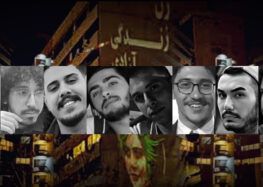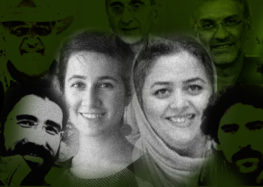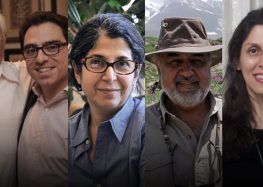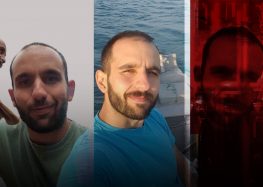Niloufar Bayani Absent from Trial After Protesting Prosecution’s Use of Forced “Confessions”
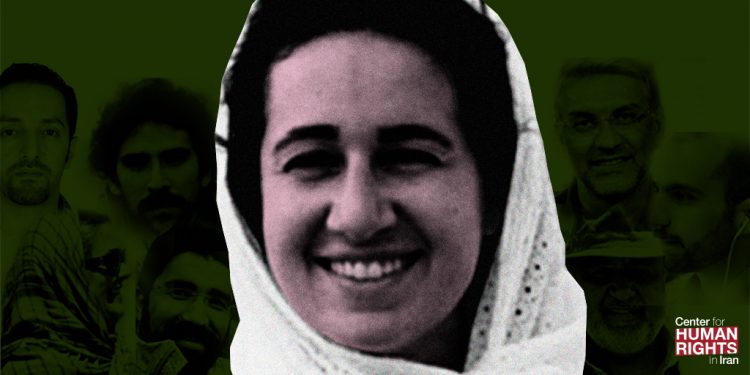
Authorities Interrogated Three People, Warned Them Not to Speak About Cases
After protesting the prosecution’s use of false statements she had made under the threat of torture, Niloufar Bayani has been absent from three out of the five court sessions that have been held so far in Tehran in the cases of eight conservationists who’ve been detained there since January 2018.
The Center for Human Rights in Iran (CHRI) has also learned that at least three people in Tehran have been interrogated by the authorities and pressured not to speak publicly about the cases, with at least two of their computers confiscated.
“Niloufar has been absent from three out of the five court sessions for the conservationists,” a source told CHRI on February 18, 2019, adding that her lawyer had been present at the sessions.
During the first session of the closed-door trial of Bayani, Houman Jowkar, Taher Ghadirian, Morad Tahbaz, Sepideh Kashani, Amir Hossein Khaleghi, Sam Rajabi and Abdolreza Kouhpayeh on January 30, 2019, at Branch 15 of the Revolutionary Court presided by Judge Abolqasem Salavati, Bayani stated that part of the indictment was based on forced statements she had made under threats of torture by her interrogators.
“When the defendant persisted, the judge warned her to stop her objections but after she continued to object she was allowed to talk for a few minutes about the coerced nature of the confessions and the surrounding circumstances,” a source with knowledge of the cases told CHRI on January 30.
It is not known why the conservation scientist has been absent from the trial, a fact that has also been reported by state-run media outlets. A source told CHRI that none of the defendants have been allowed to speak since the indictment-reading sessions began and that Bayani was only allowed to talk briefly after refusing to be silent.
Salavati is notorious in Iran for issuing harsh sentences in politically sensitive cases. In interviews with CHRI, several Iranian human rights lawyers criticized Salavati for ignoring arguments by the defense in court and bowing to the demands of the prosecution, especially in cases in which the arresting authority was the Islamic Revolutionary Guard Corps’ (IRGC’s) Intelligence Organization.
The IRGC’s Intelligence Organization arrested the eight conservationists on January 25, 2018. The day before, the agents had arrested their colleague, sociologist Dr. Kavous Seyed-Emami, who died suddenly in Tehran’s Evin Prison on February 8 while held there for interrogations.
The remaining eight, all staffers of the Tehran-based Persian Wildlife Heritage Foundation where Seyed-Emami was managing director, were held incommunicado without access to counsel for several months after their arrests and only allowed to hear what was in the indictment against them on the first day of their trial.
Defendants Refused Hard Copy of Indictment
At least 300 pages, the indictment has been read over the course of three sessions to the defendants who’ve been denied their own hard copies.
“In the first 150 pages of the indictment, no witnesses or evidence were presented by the judicial authorities to prove their case,” a source told CHRI in January 2019.
“So far it seems that the court is entirely relying on false confessions, which these individuals have repeatedly retracted because of the circumstances in which they were extracted,” added the source.
Three People Detained, Pressured Not to Speak About Cases
Since late January 2019, at least three people familiar with the cases have been interrogated in Tehran.
“This month [February] at least one person was arrested for a day and last month [January] two people were interrogated for four to five hours,” said a source on the condition of anonymity, adding that at least two of the detainees’ computers were confiscated from their homes.
The source added that the three were released after being warned not to speak publicly about the cases or their own detentions.
Subjecting friends, family members and lawyers of defendants held in politically sensitive cases to various forms of harassment and intimidation is common in Iran to prevent them from speaking to media outlets.
Bayani and Seyed-Emami’s widow, Maryam Mombeini, were both pressured to engage in staged scenes set up by Iranian agents to implicate them in the false narrative that the prosecution has been building around the conservationists.
In one instance, plainclothes agents transported conservation scientist Niloufar Bayani out of Evin Prison in Tehran to several locations in an affluent town for a day and directed her to engage in specific acts while filming her without her consent.
In another instance, plainclothes agents including a film crew forcefully entered the home of now-deceased academic Kavous Seyed-Emami (one of the original nine conservationists arrested who died while in detention in Evin Prison in February 2018 under highly suspicious circumstances) and pressured his grieving widow to make false statements on camera while denying her access to a lawyer.
Widow’s Travel Ban Extended
Mombeini has been barred from leaving Iran despite calls from the Canadian government for her to be granted permission to travel back to Canada to live with her two sons who left the country in March.
The travel ban that was imposed on her that month was recently extended for another three months even though she has not been formally charged, her son Ramin Seyed-Emami told CHRI on February 19.
“…She herself has not been accused of anything and yet they have banned her from traveling! Someone explain to me how this can be justified under religious, ethical, legal, political, intelligence or security principles?!” tweeted Member of Parliament Mahmoud Sadeghi after hearing of the extension.
Seyed-Emami’s family has petitioned the Islamic Republic of Iran Broadcasting (IRIB) organization to allow them to respond to the unsubstantiated accusations the broadcaster has aired against the deceased academic.
Three major state agencies in Iran, including the country’s highest security body, have stated that the detained conservationists are all innocent of the spying charges they’re being held on.
Their continued detainment has prompted an international outcry. The UN has called the charges against the conservationists “hard to fathom” and in February 2018 stated, “Nowhere in the world, including Iran, should conservation be equated to spying or regarded as a crime.”

